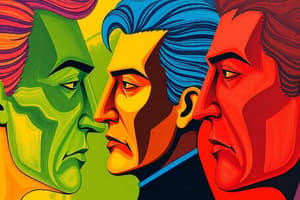Podcast
Questions and Answers
Which type of authority is characterized by the legitimacy of its existence, often seen in monarchies?
Which type of authority is characterized by the legitimacy of its existence, often seen in monarchies?
- Charismatic authority
- Traditional authority (correct)
- Legitimacy authority
- Rational-legal authority
What is a major characteristic of charismatic authority?
What is a major characteristic of charismatic authority?
- It operates through established legal systems.
- It emerges typically in times of crisis. (correct)
- It is based on a person’s hereditary position.
- It is universally respected and long-lasting.
Which type of government is characterized by a single ruler or party with significant control over the state?
Which type of government is characterized by a single ruler or party with significant control over the state?
- Theocratic government
- Collective governance
- Democratic government
- Totalitarian government (correct)
Which model of power sharing emphasizes that power is distributed among various groups?
Which model of power sharing emphasizes that power is distributed among various groups?
What is a defining feature of authoritarian governments?
What is a defining feature of authoritarian governments?
What concept is most closely associated with the idea of hegemonic power?
What concept is most closely associated with the idea of hegemonic power?
Which type of authority is typically defined by laws and established regulations?
Which type of authority is typically defined by laws and established regulations?
In the context of sociology, what does the term 'power elite' refer to?
In the context of sociology, what does the term 'power elite' refer to?
What makes rational-legal authority legitimate?
What makes rational-legal authority legitimate?
Which of the following accurately describes the structure of the state?
Which of the following accurately describes the structure of the state?
In the context of South Africa, what does the term 'pre-apartheid segregation' refer to?
In the context of South Africa, what does the term 'pre-apartheid segregation' refer to?
What does 'domination and struggle' in politics primarily refer to?
What does 'domination and struggle' in politics primarily refer to?
Which statement about the state and government is correct?
Which statement about the state and government is correct?
Which form of state serves the interests of the dominant group?
Which form of state serves the interests of the dominant group?
What characterizes military states?
What characterizes military states?
What was a significant aspect of the post-apartheid period in South Africa during the early 1990s?
What was a significant aspect of the post-apartheid period in South Africa during the early 1990s?
Flashcards are hidden until you start studying
Study Notes
Power and Politics
- Power is the ability of individuals or groups to make their concerns or interests count, even when others resist.
- Power can involve the use of force.
- Marxist theory suggests that government serves the interests of the dominant capitalist group.
- Racial elite theory suggests that government is controlled by a small power elite.
- Antonio Gramsci:
- Hegemony: The most powerful political group.
- Power is expressed through coercion and consent.
- Power exists in all social institutions and is used by the powerful to ensure their own interests.
Authority
- Weber identified three types of authority:
- Traditional Authority: Accepted based on the legitimacy of its existence. Example: Inherited power of monarchy (kings, queens).
- Charismatic Authority: People accept the power of a certain person because they are drawn to their personal qualities. This power usually emerges in a crisis and offers innovative or radical solutions.
- Rational-legal Authority: Power is made legitimate by laws, written rules, regulations, etc. Power is invested in a rational system/ideology rather than a person. Example: Constitution.
The State
- The state is all-encompassing.
- Consists of: Legislature, the executive, and the judiciary.
- Legislature: Parliamentary and political party systems / Parliament: Elected body.
- Executive: Government ministries, departments, and apparatuses implementing legislation.
- Judiciary: Legal and court systems.
- The state includes the legislation/government, judiciary, and executive.
- The government can change, but the state continues to function based on its past.
Government vs. State
- The government refers to the sphere of legislature.
- The political party with the most members in parliament forms the government.
- The government is a part of the larger state.
Domination & Struggle
- Different forms of states exist, including capitalist, military states, authoritarian states, and liberal democratic states.
- Nation-States are states linked to national groups including citizens, who have their own specific history and territory. Each nation-state is linked to others within a global system.
- The state serves the interests of the dominant group due to the division of society into dominated and dominant groups.
- Social struggles take place because of these divisions.
Segregation, Apartheid, and Post-Apartheid South Africa
- South Africa was established in 1910.
- Segregation: From 1910 to 1948, a period of pre-apartheid segregation took place.
- Apartheid: This system was established in South Africa in 1948.
- The early 1990s were seen as transitional years in post-apartheid South Africa.
Studying That Suits You
Use AI to generate personalized quizzes and flashcards to suit your learning preferences.




